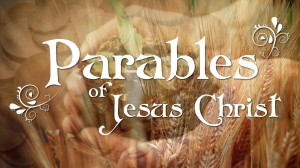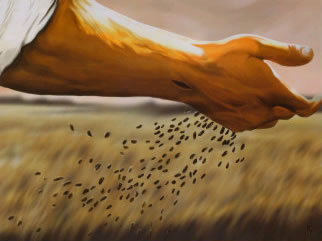Yes, you read that title correctly.
I know, I know. Popular preaching advice tells you that “People learn through stories,” and that “You need illustrations to make your point.”
I do not disagree that stories and illustrations are helpful in preaching. But they are not always helpful …
I do disagree, however, that the reason we should use stories in preaching is because Jesus used stories. While He did tell stories, He didn’t use stories in His preaching. At least, not the way we think.

Let me clarify by stating five points about the use of stories in preaching and teaching.
1. Maybe your sermons are too long
One reason it is true that people need stories sprinkled liberally throughout sermons is because the sermons are too long.
Like it or not, people have a short attention span these days, and the stories, jokes, and illustrations help keep people’s attention.
Stories help revive people’s interest in what you are saying, especially when it takes you 40 minutes to say it.
But what would happen if what you were saying was shorter? Maybe fifteen minutes? Or ten? Or *gasp* five?
Would you need tear-jerker stories and cute illustrations then? I think not.
Which makes you wonder … why is the average sermon about 35 minutes long? I have my theories, but that’s another blog post…
2. Yes, Jesus told stories, BUT …
Second, while much of the Bible is narrative, people often say that we should use stories because Jesus did, and He was the best teacher the world has ever seen.
I do not deny that Jesus was the best teacher, but I do question the logic of the statement, “Because Jesus used stories, so should we.”
Just because Jesus does something, this does not mean that we should do it too. But more than that, if you carefully examine why Jesus used stories, it was not to illustrate His point or to help His listeners understand what He was saying. No, Jesus clearly stated that the reason He spoke in parables was so that His listeners would not understand (check out Luke 8).
Jesus told stories so that people would be confused!
So if you really want to teach like Jesus, make sure you pick stories for your sermons that are confusing and mysterious and which hide your point rather than reveal it.
 If you want to include stories and illustrations to help people understand what you are saying, this is fine to do; just don’t say you are following the example of Jesus.
If you want to include stories and illustrations to help people understand what you are saying, this is fine to do; just don’t say you are following the example of Jesus.
3. The facts can teach too
Thirdly, while it is true that stories do teach, it is also true that just presenting the facts is also a great way of teaching.
While I often learn great truths from watching movies or reading novels, most of the things I have learned about theology came from reading books about theology, reading commentaries, and just studying the Bible.
I think there are large numbers of Christians today who learn similarly. They just want to know what the Bible says, and they don’t want a bunch of stories, illustrations, and jokes to get in the way.
4. The Bible is One Big Story
Fourth, the “Jesus told stories and so should we” argument often points to the fact that large chunks of the Bible are “stories.” This fact is used to bolster the argument that people learn by stories and we should sprinkle our teaching opportunities with stories.
But notice that when the Bible tells stories, it is not sprinkling a fact-based teaching with cute illustrations and funny jokes.
No, when the Bible tells stories, it tells a story and then shuts up about it.
Sure, there may be a point to the stories, but the point is often up for argument and open to interpretation.
So if you want to “tell stories” the way the Bible tells stories, then you need to make sure that your story is the teaching. If you want to tell stories like the Bible tells stories, then tell a good story and leave it alone.
I am all for using stories as a teaching method, but the best way to use stories as a teaching method is simply to tell a story. Stories as a teaching method are the stories themselves, not a regular teaching with a couple of stories sprinkled in.
5. Tell Good Stories
Finally, if you want to tell stories in your teaching, or as your teaching, make sure the story is a good one. The biblical stories are really good stories. They are full of mystery, intrigue, betrayal, sex, war, and everything else that makes a top-notch story.
 Most “Christian” stories are too sanitized to be any good.
Most “Christian” stories are too sanitized to be any good.
This is why movies are so powerful today. This is also why (I am convinced) movies do more to teach people about life and relationships and theology than sermons ever will. Movies are (usually) well-told stories that are nothing but stories which people watch and have their life and thinking changed as a result.
Stories and Illustrations in Sermons
I am not opposed to using stories and illustrations in sermons. I use them myself when I preach. I think they do aid in the teaching and learning process.
But I think we Christians need to do some rethinking about why we tell stories and what sorts of stories we tell. But I wonder if people would learn just as much if our sermons were 80% shorter… or maybe if they were just one well-told story.
But whatever we do, whether we include illustrations or not, whether we preach for 40 minutes or 5, we cannot say that “Jesus told stories, and so should we.” He did tell stories, but not the kind of stories we tell, and not for the reasons we tell them, and not in the way we tell them.
If you truly want to tell stories like Jesus, do these three things:
- Your teaching time should be nothing but stories.
- Your stories should target religious people only.
- Your stories should be confusing so nobody understands them.
If you know someone who teaches that way, send me a link to their podcast, because I want to hear them.




 This post on Jesus’ parables is part of the August
This post on Jesus’ parables is part of the August  In other words, Jesus told parables to mask the truth, to hide it, to cloak it, to make it unclear. Jesus’ parables are supposed to be confusing! He wanted them to be confusing!
In other words, Jesus told parables to mask the truth, to hide it, to cloak it, to make it unclear. Jesus’ parables are supposed to be confusing! He wanted them to be confusing!
 I’ve been mulling over the Parables of the Four Soils for several years.
I’ve been mulling over the Parables of the Four Soils for several years.
